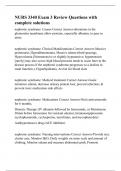NURS 3340 Exam 3 Review Questions with complete solutions
nephrotic syndrome: Causes Correct Answer-alterations in the glomerular membrane allow proteins, especially albumin, to pass in urine.
nephrotic syndrome: Clinical Manifestations Correct Answer-Massive proteinuria, Hypoalbuminemia, Massive edema (third spacing), Hypovolemia (Normotensive or slightly hypotensive; hypertension [rarely] may also occur; high blood pressure tends to occur later in the disease process if the nephrotic syndrome progresses to a decline in renal function.), Hyperlipidemia, At risk for blood clots
nephrotic syndrome: Medical treatment Correct Answer-Goals: minimize edema; decrease urinary protein loss; prevent infection; & prevent toxic medication side effects
nephrotic syndrome: Medications Correct Answer-Oral corticosteroids for 6 months,
Diuretic Therapy (IV albumin followed by furosemide, or Metolazone 30min before furosemise for resistant edema), Immunosuppressants (cyclophosamide, cyclosporine, tacrolimus, and mycophenolate)
Antihypertensive drug (ACE inhibitor)
nephrotic syndrome: Nursing interventions Correct Answer-Provide rest,
cluster care, Monitor I&O, Daily weights on same scale and amount of clothing, Monitor edema and measure abdominal girth, Promote pulmonary health through position changes, activity as tolerated, deep breathing & coughing exercises, spirometer use, monitor temp for signs of infection, prevent skin breakdown, administer medications as ordered,
prevent infection, monitor serum albumin and monitor protein in urine
nephrotic syndrome: Restrictions Correct Answer-Sodium and fluid restriction while edematous.
glomerulonephritis: causes Correct Answer-autoimmune, Inflammation of the glomeruli following group a beta hemolytic streptococcal infection.
glomerulonephritis: clinical manifestations Correct Answer-Gross hematuria, Mild edema (periorbital), Hypertension, Foamy, tea-colored urine, Can also have low-grade fever, oliguria, headache, anemia
glomerulonephritis: Medical treatment Correct Answer-relief of symptoms, supportive therapy
glomerulonephritis: Medications Correct Answer-Diuretics (furosemide (Lasix) to reduce fluid overload), Antihypertensive drugs to treat increased blood pressure, Antibiotics (penicillin) if a streptococcal infection is documented or detected
glomerulonephritis: nursing intervetions Correct Answer-monitor fluid status, prevent infection, prevent skin breakdown, meet nutritional needs, and provide emotional support to the child/ family, cluster care, monitor for infection, VS, I&O, daily weight, abdominal girth
glomerulonephritis: Restrictions Correct Answer-limited activity, low sodium, fluids, potassium, and low protein while in acute phase
When a child with nephrotic syndrome experiences difficulty breathing, what should you do? Correct Answer-position the child upright and administer medications
High Priority Nursing Diagnosis for a child with nephrotic syndrome who has pleural effusions and ascities Correct Answer-Ineffective breathing pattern, impaired gas exchange
What should you be concerned about with long-term corticosteroid use? Correct Answer-Infection
What is a high-priority nursing diagnosis with long-term use of steroids?
Correct Answer-Risk for Infection
When a child with acute glomerulonephritis has low urinary output, what should you do? Correct Answer-weigh the child daily
In terms of acute post-streptococcal glomerulonephritis, what sorts of medical conditions precede it? Correct Answer-streptococcal infection




